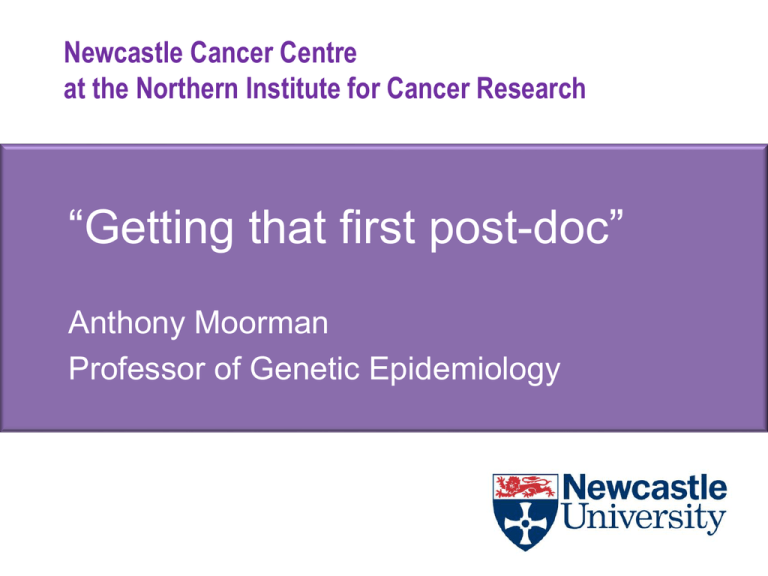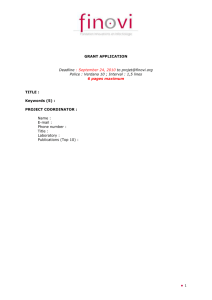“Getting that first post-doc” Anthony Moorman Professor of Genetic Epidemiology Newcastle Cancer Centre
advertisement

Newcastle Cancer Centre at the Northern Institute for Cancer Research “Getting that first post-doc” Anthony Moorman Professor of Genetic Epidemiology Overview of session • Laying the foundations of a good CV • Selecting the right post-doc for you • Applying for the job • Questions Academic Career Pathway Academic Career Pathway Academic Career Pathway Academic Career Pathway PhD Student Research Technician / Assistant / Associate Scientist Post-doc Fellowship Lecturer Independent Researcher Senior Tenured Academic Position Lecturer Professor Laying the foundations of a good CV • Finish your PhD on time • Publications – First author > Joint first author > Second author • Present research at conference – Spoken / Platform presentation – Poster presentation – International > National > Local • Techniques – Basic – State-of-the-art Networking • It's not what you know but who you know that makes the difference. [Anon] • It isn't just what you know, and it isn't just who you know. It's actually who you know, who knows you, and what you do for a living. [Bob Burg] Networking • Make yourself known – Talk to PIs etc in your institute – Accept any invitation to meet external speakers – Do “research in progress” talks. Prepare well in advance. • Attend conferences – Don’t be afraid to ask questions – Introduce yourself to leaders in the field – Ask your supervisor(s) to introduce you – If you have a poster make sure to display on time and for full length of time. Be in attendance during “poster” sessions. Your five year plan Your five year plan • Where do you want to be in five years? – Fellowship – Joint application on grant – Expert in particular technique / field – Lecturing – Industry • How is this post-doc going to get you there? Goals for your first-doc? • First author publications • First author publications • First author publications • Experience of grant preparation / writing • Learning new techniques/skills Selecting the right post-doc • “Should I stay or should I go” – Plus going abroad • Changing fields – Technique driven – Subject driven • Cast net early and wide • But be careful ..... Very important decision Assessing a potential position (1) • Are they .... – ... leaders in the field? – ... the next big thing? – ... journeymen? – ... the weakest link? • • • • Aim as high as possible Look up the RAE rating of department / unit Literature search – including citation index Money – How much have they got and from where – Cross reference their website from funders website Assessing a potential position (2) • Group metrics / dynamics – Who is publishing as first author / corresponding author? – Size of group – Ratio of senior : junior staff – Clinically active heads of lab • Who do they collaborate with? – Website PLUS publications • Use your contacts to gather informal information Preparing your CV • Clear & Concise • Divide into sections – Qualifications (including training courses) – Research Skills • Be honest, Quantify, Official training – Other skills (e.g. languages etc) – Meetings / Conferences • Presentations • Publications • Mission / Personal Statements Applying for a position • Do not apply cold. – Contact PI in advance. Ask questions about project and team. • Read their papers. • Try to find project application via funder website. • Covering letter – Write, re-write, re-write and re-write Interview Interview (1) • Smart dress • Don’t bullshit! • Be prepared to …. – Give a brief interesting overview of PhD – What your ideal next experiment would be if there were no financial or logistical problems. – Describe how did you trouble-shoot a technical problem – How you approach writing your first author paper Interview (2) • Ask some questions – Research related – What have former post-docs gone on to do? – Teaching opportunities Feedback • Please complete feedback forms
